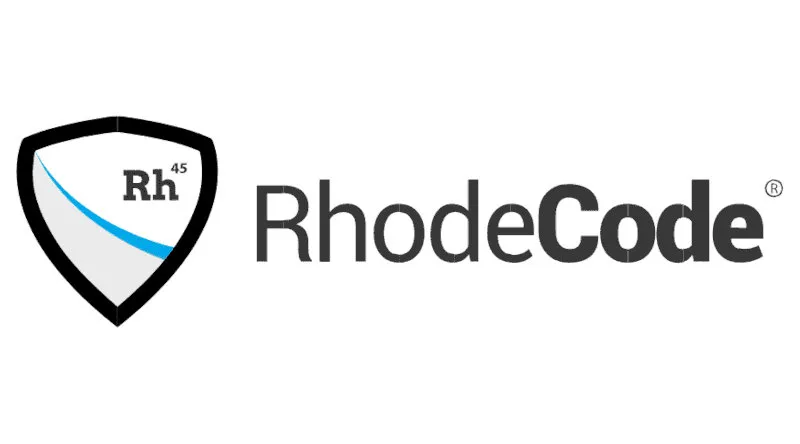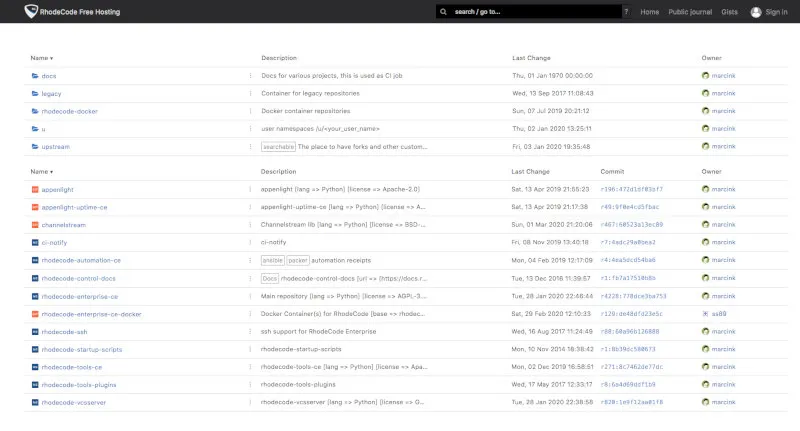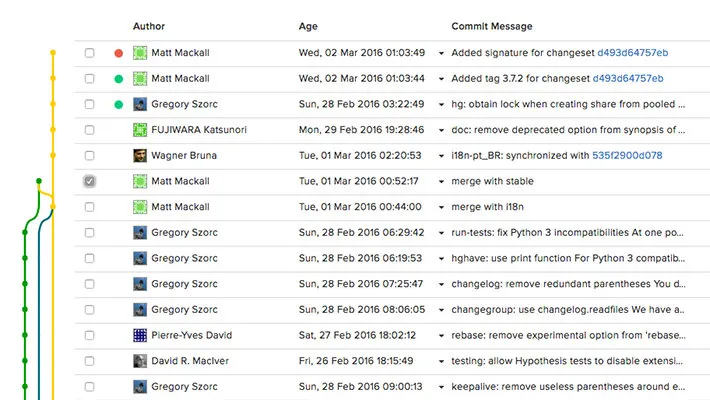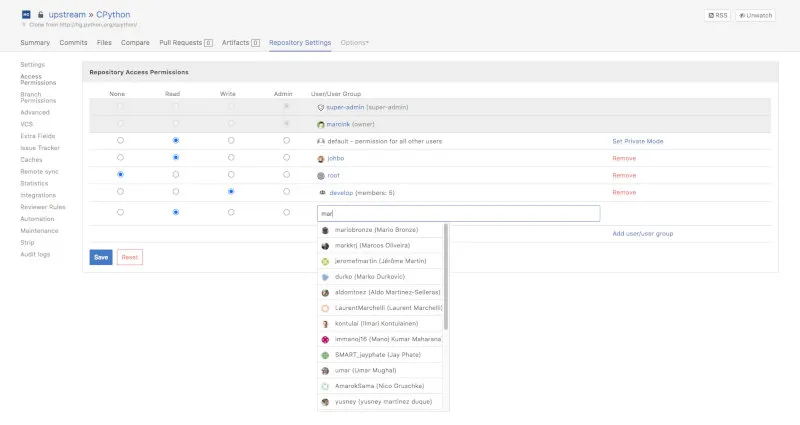
RhodeCode: A Secure, Behind-the-Firewall Code Management
Table of Contents
- Key Features at a Glance
- The RhodeCode Philosophy: Who Is It For?
- GitHub vs. RhodeCode: A Quick Comparison
- Pros and Cons
- How RhodeCode Works: A Technical Overview
- Use Cases and Real-World Applications
- Getting Started & Further Reading
- FAQ
- Conclusion
In the world of source code management, some tools are built for community and others for all-in-one DevOps. RhodeCode, however, is engineered for a different, critical purpose: providing secure, compliant, and centralized version control for the enterprise, all behind your own firewall.
RhodeCode is a self-hosted platform that uniquely offers first-class, unified support for Git, Subversion (SVN), and Mercurial (Hg). This makes it a powerful solution for organizations that need to manage a diverse set of repositories while enforcing strict security policies and maintaining full control over their intellectual property.
Key Features at a Glance

RhodeCode’s feature set is tailored for enterprise-grade control, security, and governance over source code assets.
| Feature | Description | Key Benefit |
|---|---|---|
| Unified VCS Hosting | Provides a single web interface and API to manage Git, SVN, and Mercurial repositories seamlessly. | Eliminates tool sprawl by centralizing all of a company’s code, whether legacy or modern, into one manageable platform. |
| Advanced Permission Management | Offers an extremely granular, role-based permission system that can be applied to users, groups, repositories, and even specific branches or files. | Enables enterprises to enforce strict “need-to-know” access policies, protecting sensitive IP and ensuring compliance. |
| Enterprise Security & Compliance | Built for high-security environments with features like full audit logs, integration with LDAP/Active Directory, and IP restrictions. | Meets the stringent security and regulatory requirements of industries like finance, defense, and healthcare. |
| Integrated Code Review | A powerful code review tool (pull/merge requests) that works consistently across Git, SVN, and Mercurial. | Provides a unified and high-quality code review process for all teams, regardless of their preferred version control system. |
The RhodeCode Philosophy: Who Is It For?

The philosophy of RhodeCode is centered on centralization, security, and control. It is designed for organizations where source code is a critical, high-value asset that must be protected and managed with surgical precision.
This makes it the ideal choice for:
Highly Regulated Industries: Finance, government, and healthcare organizations that require auditable, on-premise solutions to meet compliance standards.
Companies with Mixed VCS Environments: An organization with active SVN or Mercurial projects that is transitioning to or also using Git can unify its entire workflow.
IP-Sensitive Businesses: Semiconductor designers, game developers, and research firms that cannot risk their source code leaving their own network.
Large Enterprises Needing Granular Control: Teams that need to enforce complex access rules that go far beyond the standard permissions of other platforms.
If your mantra is “our code never leaves our network, and we control exactly who can touch what,” RhodeCode is built for you.
GitHub vs. RhodeCode: A Quick Comparison
The differences between GitHub and RhodeCode clearly illustrate their different target markets and design goals.
| Aspect | GitHub | RhodeCode |
|---|---|---|
| Primary Focus | Community, Open Source, Developer Experience | Enterprise Security, Compliance, Multi-VCS Unification |
| Hosting Options | Cloud (SaaS) and Self-hosted (Enterprise) | Self-hosted only (Community and Enterprise editions) |
| Version Control | Git only | Git, Subversion (SVN), and Mercurial (Hg) |
| Security Model | Robust user/team permissions | Highly granular, rule-based permission system |
Pros and Cons

Why You Might Choose RhodeCode
Exceptional Multi-VCS Support: This is RhodeCode’s killer feature. Its ability to manage Git, SVN, and Hg in a unified way is unmatched and a lifesaver for organizations with legacy systems.
Best-in-Class Permission System: The fine-grained control over who can see and modify what part of a codebase is a critical differentiator for security-focused enterprises.
Full On-Premise Control: Being self-hosted means you have complete authority over your hardware, data, security protocols, and uptime.
Python-Based and Extensible: The platform is built on Python, making it familiar to many operations teams, and it offers a robust API for integrations.
Potential Drawbacks
No Integrated CI/CD: RhodeCode focuses on source code management and review. For CI/CD, you must integrate it with external tools like Jenkins or TeamCity, which adds a layer of complexity.
Self-Hosted Only: There is no SaaS offering, placing the full burden of installation, maintenance, updates, and backups on your team.
Smaller Ecosystem: You won’t find the vast marketplace of apps and community integrations that surrounds platforms like GitHub or GitLab.
Niche Focus: If you only use Git and don’t require its advanced permission model, its main advantages are lost, and other platforms may offer a more streamlined experience.
How RhodeCode Works: A Technical Overview

RhodeCode operates as a self-hosted web application that centralizes version control system (VCS) management. Built on Python, it runs on your own servers, ensuring data remains within your infrastructure. Here’s how it functions:
-
Unified Repository Management: RhodeCode provides a single web interface and API to interact with Git, SVN, and Mercurial repositories. It abstracts the differences between these VCSs, allowing users to manage repositories, branches, and commits through a consistent dashboard.
-
Permission System: Its role-based access control (RBAC) system allows administrators to define permissions at multiple levels—users, groups, repositories, or even specific branches and files. For example, a developer might have write access to a specific branch but only read access to sensitive configuration files.
-
Code Review Workflow: RhodeCode’s integrated code review system supports pull requests (Git, Mercurial) and equivalent workflows for SVN. Reviewers can comment, approve, or request changes, with all actions logged for auditability.
-
Security Features: It integrates with LDAP or Active Directory for user authentication, supports IP whitelisting, and maintains detailed audit logs for compliance. All data is stored on-premise, ensuring no external exposure.
-
Extensibility: The platform’s Python-based architecture and REST API allow integration with tools like Jenkins, Jira, or custom scripts, enabling tailored workflows.
This technical foundation makes RhodeCode a robust choice for enterprises needing a secure, unified VCS solution.
Use Cases and Real-World Applications
RhodeCode shines in scenarios where security, compliance, and multi-VCS support are critical. Here are some practical examples:
-
Financial Institutions: A bank with legacy SVN repositories for core banking systems and newer Git-based microservices uses RhodeCode to manage both in a single platform. Its granular permissions ensure only authorized developers access sensitive financial code, while audit logs support regulatory compliance.
-
Game Development Studios: A studio developing a AAA game with proprietary code uses RhodeCode to keep all assets on-premise. The permission system restricts junior developers to specific modules, protecting intellectual property like game engine code.
-
Government Agencies: A defense contractor uses RhodeCode to manage Mercurial repositories for legacy projects and Git for new ones. IP restrictions and LDAP integration ensure only cleared personnel access classified codebases.
-
Enterprises in Transition: A manufacturing firm transitioning from SVN to Git uses RhodeCode to maintain both systems during the migration. Its unified code review process ensures consistent quality across teams.
These use cases highlight RhodeCode’s ability to address complex, enterprise-specific needs while maintaining security and control.
Getting Started & Further Reading
Ready to lock down your source code management? Explore RhodeCode with these official links.
Official Website: https://rhodecode.com/
Documentation: https://docs.rhodecode.com/
Editions & Pricing: https://rhodecode.com/pricing
Community Portal: https://portal.rhodecode.com/
FAQ
What version control systems does RhodeCode support?
RhodeCode supports Git, Subversion (SVN), and Mercurial (Hg), providing a unified interface for managing all three.
Is RhodeCode available as a cloud-hosted solution?
No, RhodeCode is self-hosted only, available in Community and Enterprise editions, ensuring full control over your data and security.
Can RhodeCode integrate with CI/CD tools?
Yes, RhodeCode can integrate with external CI/CD tools like Jenkins or TeamCity, but it does not include built-in CI/CD functionality.
How does RhodeCode ensure security for sensitive codebases?
RhodeCode offers granular permission management, full audit logs, LDAP/Active Directory integration, and IP restrictions to meet enterprise security and compliance needs.
Is RhodeCode suitable for small teams or startups?
While RhodeCode excels for enterprises with complex needs, small teams using only Git and not requiring advanced permissions might find simpler alternatives like GitHub or GitLab more suitable.
Conclusion
RhodeCode is not a general-purpose GitHub clone; it is a specialized instrument for a critical job. It provides a secure, powerful, and unified environment for enterprises that need to manage a mix of Git, SVN, and Mercurial repositories behind their own firewall. For organizations where security, compliance, and granular control are non-negotiable, RhodeCode offers a robust and compelling solution that stands in a class of its own.